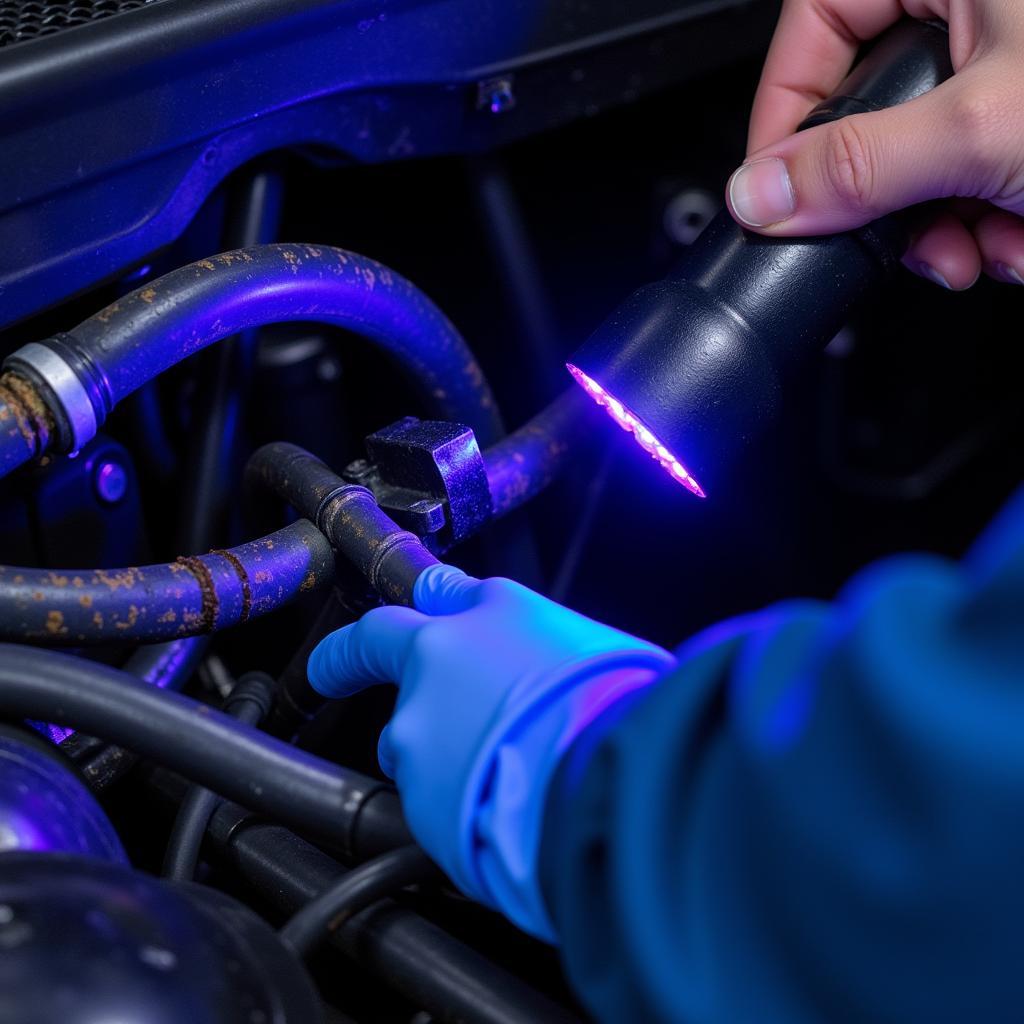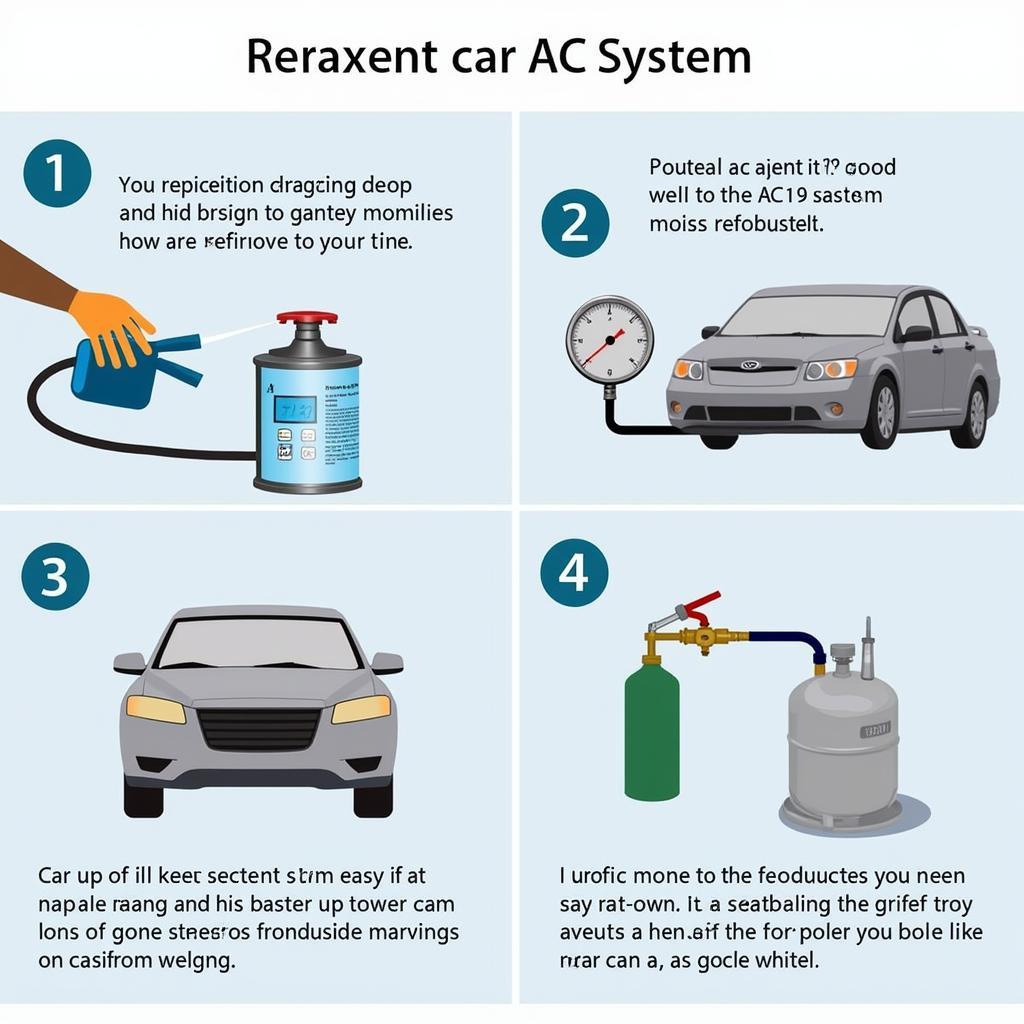Dealing with a broken car AC, especially during the scorching summer months, can be a real pain. Knowing how to fix an air conditioning leak in your car can save you a significant amount of money and keep you comfortable on the road. This guide will walk you through common causes of AC leaks, how to diagnose them, and offer practical solutions, even for those who aren’t mechanically inclined.
Common Causes of Car AC Leaks
Car AC systems are complex, but most leaks fall into a few key areas. These include leaks in the hoses and connections, the compressor, the condenser, the evaporator, or the seals and O-rings throughout the system. Each component plays a crucial role, and a leak in any of them can lead to inefficient cooling or a complete system failure. Understanding the function of each part helps in pinpointing the leak source.
Identifying Leaks in Hoses and Connections
Hoses and connections are often the first place to check for leaks. Look for visible cracks, loose fittings, or oily residue around the hose connections. These are telltale signs of a potential leak.
 Car AC Hose Leak Detection
Car AC Hose Leak Detection
Compressor Leaks: A Costly Issue
The compressor is the heart of the AC system, and leaks here can be expensive to fix. Often, a noisy compressor, coupled with poor cooling performance, indicates a potential leak.
Condenser Leaks: Vulnerable to Debris
The condenser, located at the front of the vehicle, is exposed to road debris and can be susceptible to damage and leaks. Look for physical damage or signs of leakage around the condenser fins.
Evaporator Leaks: The Sneaky Culprit
Evaporator leaks are more challenging to detect, as the evaporator is located inside the dashboard. A sweet smell inside the car, along with reduced cooling, can indicate a leak in the evaporator.
Seal and O-ring Failures
Seals and O-rings are essential for maintaining a closed system. Over time, they can dry out and crack, leading to refrigerant leaks.
How to Fix an Air Conditioning Leak in Your Car: A Step-by-Step Guide
While some leaks require professional attention, others can be addressed with some DIY know-how.
- Identify the Leak: Use a UV dye kit designed for AC systems. This dye circulates with the refrigerant and glows under UV light, making the leak easy to spot.
- Tighten Loose Connections: If the leak is at a hose connection, try tightening it with a wrench. Be careful not to overtighten.
- Seal Minor Leaks: For small leaks in hoses or components, a sealant specifically designed for AC systems can be effective.
- Replace Damaged Components: If a hose, O-ring, or other component is significantly damaged, replacement is necessary.
- Recharge the System: After fixing the leak, recharge the system with the correct type and amount of refrigerant.
 Recharging Car AC System
Recharging Car AC System
Expert Insights on Fixing Car AC Leaks
“Regular maintenance is key to preventing AC leaks,” advises John Miller, a certified automotive technician with over 20 years of experience. “Inspecting your AC system annually can save you from costly repairs down the road.”
Another expert, Sarah Johnson, a mechanical engineer specializing in automotive climate control, adds, “Using the correct type of refrigerant is crucial. Using the wrong refrigerant can damage the system and lead to leaks.”
Conclusion: Keeping Your Cool on the Road
Fixing an air conditioning leak in your car doesn’t have to be a daunting task. By understanding the common causes, using the right diagnostic tools, and following the proper steps, you can keep your car cool and comfortable, even on the hottest days. For persistent issues or complex repairs, don’t hesitate to seek professional help. Connect with us at AutoTipPro for expert advice and assistance. Call us at +1 (641) 206-8880 or visit our office at 500 N St Mary’s St, San Antonio, TX 78205, United States.
FAQ
- How much does it cost to fix an AC leak in a car? The cost varies depending on the location and severity of the leak, ranging from a few dollars for a simple O-ring replacement to hundreds for a compressor replacement.
- Can I drive my car with an AC leak? While you can technically drive, it’s not recommended. The leak will worsen, leading to complete system failure and potential damage to other components.
- How often should I recharge my car’s AC? A properly functioning system shouldn’t require frequent recharging. If you need to recharge often, it indicates a leak.
- What are the signs of a low refrigerant charge? Weak airflow, warm air from the vents, and unusual noises from the AC system are common signs.
- Can I fix an AC leak myself? Minor leaks can sometimes be fixed with DIY solutions, but more complex issues require professional expertise.
- How can I prevent AC leaks? Regular inspections and maintenance are the best ways to prevent leaks.
- What type of refrigerant does my car use? Check your owner’s manual or a sticker under the hood for the correct refrigerant type.




Leave a Reply